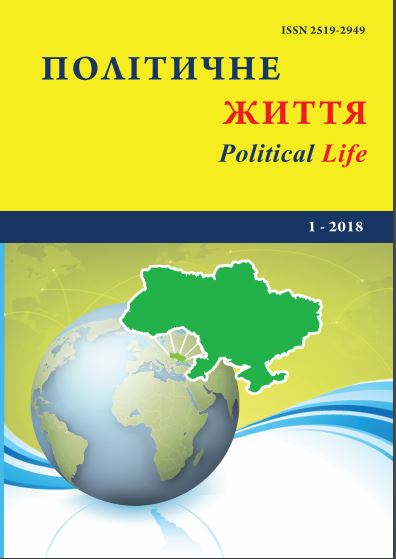The modern forms of political actionism: analysis of political science component.
DOI:
https://doi.org/10.31558/2519-2949.2018.1.3Keywords:
political actionism, postmodernism, political performance, political happening, political art installation, political installation, political flash mob (political mob), politically oriented body artAbstract
In the article political actionism is defined as a system of artistically pronounced forms of political protest, public debate and discussed, which demonstrate theatricality, game components, staginess, dynamics etc. It is underlined that political actionism is a combination of spectacular forms of political participation of protest and provocative nature (sometimes also antisocial) intended to challenge the existing political system.
The author emphasizes that political activism combines a number of non-violent protest technologies at the intersection of political activism and artistry, aimed mostly and media attention and receiving further public resonance. Political activism is presented as artistic, spectacular and game form of delivering a political message. The author proposed a system of political activism features: non-institutional character; general impartiality in delivering some political message, but attention is paid to the fact that political activism may represent a certain ideology, political force; the idea of action is promoted in order to draw attention to the problem, but the primary interaction is carried out with the spectators rather than with the authorities. The spectators may take part in the action while it is being carried out or respond to it later (through messages in social networks, sharing pictures or videos etc.).
The article argues that the system of political actionism consists of political performance, happening, art installations, street art, flash mobs, body art etc. The following functions of political actionism have been defined: information and communication (communicating a certain political idea, generation of new political meanings, rapid spread of new information); political socialization (the political outlook of people and their understanding of politics is shaped under the influence of different actions; actionists play the role of political socialization agents); political mobilization (uniting people in order to promote a political idea, enhancing participation in potential actions).
Political performance is viewed as a type of actionist practices, which is a visual and procedural composition (game, performance) on political issues with symbolic attributes that is presented to random or invited audience. Political happening is defined as an actionist, improvisational form of political activity involving casual participant with conventional and dynamically changing scenario of the action. Political installation is viewed as a spatial art composition, the combined elements of which are endowed with symbolism, transmitting and manifesting some political ideas. The article considers political flash mob as spectacular and playful kind of the political actionism technology that consists of single or wavy performance of short theatrical mass actions according to a pre-agreed scenario; it is a spectacular network interaction, which is carried out on the basis of horizontal social communication. Political street art is viewed as politically oriented street art, which visualizes the socio-political process, usually within urbanized space. The article presents scientific approaches to interpretation of political body art as a type of actionism, which uses the body language through drawing pictures on it in order to visualize the political self-identification. Political body art is defined as a method of non-verbal communication, person drawing attention to himself or herself (emphasizing the individuality), and a way of increasing the political “recognizability” of a person.
References
Бодріяр Ж. Симулякри і симуляція / Ж. Бодіяр; [пер. з фр. В. Ховхун]. ‒ К.: Основи, 2003. ‒ 230 с.
Дебор Ги. Общество спектакля / Ги Дебор; [пер. с фр. C. Офертас, М. Якубович]. ‒ М. : Логос, 1999. ‒ 224 с.

